MercoPress. South Atlantic News Agency
Tag: dollar clamp
-
Saturday, July 20th 2013 - 05:46 UTC
Money exchange controls limit Argentines from travelling to Brazil to greet Pope Francis
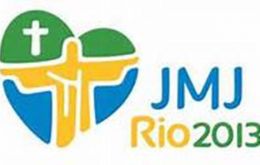
Despite the pope is Argentine and on Monday he will be making his first pastoral trip overseas to Brazil, Argentine government strict currency controls are making it difficult for prospective pilgrims to travel. An estimated 60.000 Argentines are expected to travel to Rio do Janeiro for the grand event.
-
Tuesday, June 25th 2013 - 05:57 UTC
Argentine central bank has lost 17% of reserves since the ‘dollar clamp’
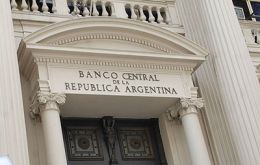
Argentine central bank international reserves dropped 17% since the government of President Cristina Fernandez imposed the ‘dollar clamp`, first limiting operations in the US currency and later savings in greenbacks. While this happened in Argentina in other regional central banks, international reserves kept climbing, according to a report from consultants Economia&Regiones (E&R).
-
Thursday, May 23rd 2013 - 07:01 UTC
Cristina Fernandez administration limits overseas dollar extractions to a minimum
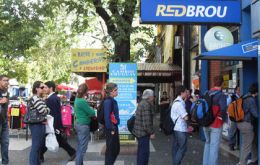
Continuing with the so called ‘dollar clamp’ Argentine institutions issuing credit cards will further limit the extraction of dollars from automatic cashiers: travellers to neighbouring countries will only be allowed 100 dollars every three months and those visiting non neighbouring countries, 800 dollars per month.
-
Saturday, May 18th 2013 - 03:35 UTC
“Blue” dollar in Argentina picks up in last day of trading and reaches 8.95 Pesos

In the last business day of the week in Buenos Aires, the parallel market or ‘blue’ dollar rose to 8.95 Pesos (selling price) after its declining tendency during the week, while the official rate ended steady at exchange houses at 5.245 Pesos (selling price). The gap between the two markets stands at over 70%.
-
Tuesday, May 14th 2013 - 06:49 UTC
Whitewashing draft bill and Moreno have US ‘blue’ dollar market in Argentina flat

Trading of the ‘blue’ or parallel dollar in Argentina remained flat on Monday for a second day following last week’s events when the 10 Pesos barrier was broken and the government reacted with a tax amnesty or whitewashing draft bill promising all dollar assets holders a new clean record and no questions asked if they turn their greenbacks into government bonds or promissory notes.
-
Thursday, May 9th 2013 - 05:13 UTC
Do you trust this Lady to look after your dollar savings?

The administration of President Cristina Fernandez sent on Wednesday to congress the tax amnesty bill to tap undeclared dollar assets, in the country and overseas, generating a cascade of critical reactions from well known economists while the ‘blue dollar’ in the parallel market seemed to ignore the announcements and kept climbing to a new record high.
-
Thursday, May 9th 2013 - 05:05 UTC
Argentine official pledges to look into ‘blue’ dollar market and admits problems in real estate sector

Argentina Deputy Economy minister Axel Kicillof pledged “to look into” the growing parallel market for the US dollar because it is harming many innocent people who have nothing to do with speculation and claimed that ‘certain economists’ and media are encouraging speculation with the greenback.
-
Thursday, May 9th 2013 - 04:56 UTC
Argentina: Dollar kept climbing on Wednesday and reached 10.45 Pesos
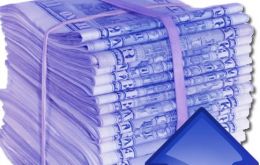
Despite the tax amnesty bill and investment options pledged by the government of President Cristina Fernandez, the dollar kept climbing in Argentina. After breaking the key psychological barrier of 10 Pesos to the dollar on Tuesday, the “blue” dollar which trades on the parallel market climbed again on Wednesday another 37 cents to reach 10.45 Argentine Pesos.
-
Wednesday, May 8th 2013 - 09:51 UTC
Argentina offers tax amnesty for undeclared dollars and assets in the country and overseas

The administration of President Cristina Fernandez announced the drafting of a bill intended to establish a recovery plan for undeclared assets within the country and abroad in order to strengthen the level of foreign reserves of the Central Bank. The government estimates Argentines hold 160bn dollars outside the financial system in the country and overseas.
-
Wednesday, May 8th 2013 - 09:23 UTC
Argentines keep travelling overseas despite the ‘dollar clamp’ and the ‘Coca Cola formula’
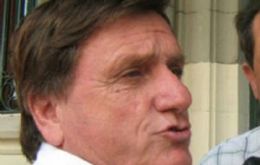
Despite the ‘dollar clamp’ and other obstacles to purchase the US currency in Argentina, the number of Argentines travelling abroad increased by 8% last March in comparison to the same period the year before although they spent 6.2% less than in 2012, it was reported by the National Statistics Bureau (INDEC).
